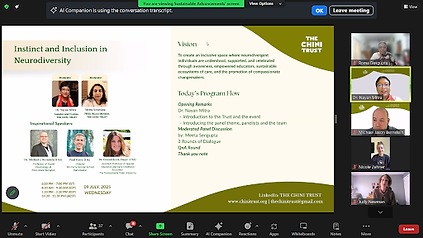
Founder’s Day 2025 | The CHINI Trust
Panel Discussion: “Instinct and Inclusion in Neurodiversity”

Date: July 09, 2025 (Wednesday)
Time: 6:00 PM - 7:00 PM IST
Mode: Online
On our Founder's Day, 09 July, 2025 , Team The CHINI Trust organized a powerful and emotionally resonant online panel discussion titled “Instinct and Inclusion in Neurodiversity.” The event brought together international experts, educators, psychologists, and changemakers to explore how inclusion can be more than a principle- an instinct rooted in empathy, respect, and practical action.
The session began with Dr. Nayan Mitra, Trustee at The Chini Trust (Chini's mother) where she reflected on Chini’s enduring vision: creating a world where neurodivergent individuals are not merely accepted, but celebrated. Dr. Mitra emphasized the Trust’s ongoing work in mental health advocacy, inclusive education, and ethical engagement. She also revisited the First Annual Lecture held on February 9, 2025, titled “Education, Consent, and Disabilities: Creating Connections through Ethical Commitments,” which marked a turning point in the Trust’s programming and outreach.
To further this mission, new scholarships and a memorial prize was announced during the session, designed to support individuals working in inclusive fields- The Parul Bala Sen Scholarship for special educators, The Will Ferry Soccer School Scholarship – for inclusive sports trainers, The Gentle Giant Initiative – for ecological and systemic inclusion and The Renu Dasgupta Memorial Prize – recognizing outstanding contributions to inclusive practices.
Following this, Ms. Meeta Sengupta, newly inducted board member and co-moderator, opened the panel with a powerful message: every individual is uniquely wired, and
difference itself holds purpose. She set the tone for the conversation by calling on society to not merely accommodate neurodiversity- but to reframe it as a strength.
The event was graced by a distinguished panel of international speakers: ∙ Dr. Michael Bernstein (USA) – Professor of Social Psychology, Penn State Abington ∙ Mr. Paul Ferry (UK) – Director, Will Ferry Soccer School, Manchester
∙ Dr. Gwendolyn K. Deger (USA) – Assistant Professor of Special Education and Early Childhood Education, Penn State, and a neurodivergent educator.
Dr. Bernstein discussed attribution theory and its relevance to inclusion—arguing that we often judge neurodivergent behavior through an unfair, deficit-focused lens. Instead of asking neurodivergent individuals to change, he emphasized the importance of changing systems to be more accommodating and supportive. He stressed that the goal isn’t to “fix” neurodivergent individuals, but to better understand and include them.
Mr. Ferry, drawing from his work in sports, shared how inclusive participation transformed students’ confidence and sense of belonging. His focus shifted from “supporting” to simply inviting and including, showing how powerful access and visibility can be for neurodivergent youth. He reflected that participation itself proved to be transformative.
Dr. Deger offered a deeply personal perspective, sharing her experiences as a person with ADHD and other neurodivergent traits. She questioned the use of the word “deficit,” suggesting that neurodivergent brains often process more, not less. She advocated for responsive teaching strategies—such as allowing hand-fidgets, offering recorded lectures, and creating flexible classroom environments. Her approach, rooted in lived experience and research, calls for educators to slow down, give students language to describe their internal experiences, and teach without rushing to label.
The panel was then invited to respond to questions about the challenges they face and the changes they wish to see. Their answers were grounded in a common call for institutional accountability and adaptive environments rather than expecting neurodivergent individuals to adjust.
In a particularly engaging moment, Ms. Meeta asked each speaker: “What is your first instinct toward neurodivergent individuals, and how do you ensure others act inclusively too?”
Paul Ferry responded: “Instinct is built with experience.” He advocated for personal, one on-one engagement even in group spaces, to truly understand and adapt to each learner’s needs.
Dr. Deger described her creative approaches—like “pause-and-restart,” open Zoom links, and recorded sessions—which ensure students with varied learning styles aren’t left behind.
Dr. Bernstein reminded educators to stretch their own comfort zones, creating environments that don’t just tolerate difference, but embrace it.
During the Q&A segment, one attendee asked if a universal template for inclusion could ever exist. Ferry responded wisely- It may not be impossible, but what truly makes a difference is empathy. When you’re empathetic toward someone different from you, inclusion becomes not just a process but a mindset.
The session concluded on an emotional note as one of Chini’s college mates shared her memories—recalling Chini’s fire, her deep commitment to communication, and her unshakeable vision for a more inclusive world. It was a reminder that this conversation was more than theoretical—it was deeply personal, built on a legacy of love and action. With over 80 participants from India, the UK, USA, Australia, and beyond, this event marked a significant step forward in global conversations on neurodiversity. It was not just a panel, but a collective affirmation that inclusion is not optional. It’s not a box to tick. It’s a practice, a perspective, and above all, an instinct—one that must be nurtured in education, policy, sports, and everyday life.
Photos:
.png)
.png)